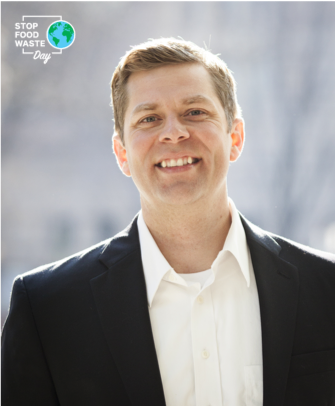5 Questions with Pete Pearson - Director, Food Loss & Waste - World Wildlife Fund
What motivated your personal interest in sustainability and food waste reduction?
Almost 10 years ago I worked for a grocery chain (Albertsons/SUPERVALU) in their IT department. Food was our business, but as an IT professional, I was somewhat removed from the business of selling food. That changed when I decided to enroll in an MBA program that focused exclusively on sustainability through Green Mountain College in Vermont. At the time, it was one the first programs of its kind. After receiving my MBA, my entire outlook on the food system had changed and it educated me on the importance of food, especially as sustainable global resource consumption gains more attention. Food is a nexus for everything: Its production drives and is hindered by climate change; it contributes significantly to the loss of forests, wetlands, grasslands and other habitats, as well as the wildlife that call them home; it accounts for 70 percent of humankind’s total freshwater consumption. It’s also critical socially, politically, and economically. If you can solve problems related to food, you can tackle a lot. Serendipitously, soon after finishing the program, I was hired as a new Director of Sustainability at Albertsons/SUPERVALU. A large part of my role was to improve our store recycling programs, including increasing our food waste prevention, donation and diversion programs. Achieving zero waste has been my full time job and core mission for a while now. I’d say I’m dedicated to waste reduction, whatever form it takes.

Can you share a story about a food waste hero who inspired you?
My first inspiration came from Rick Crandall. Rick had worked in retail operations for 30-plus years in southern California and knows the grocery retail work better than anyone. He was an amazing advocate for our zero waste program and single-handedly changed an entire culture of grocery stores in California (Albertsons). He inspired and informed our zero waste program, which he helped to start over 10 years ago. We need more Rick Crandallsin the world!
What change have you made personally to be more mindful?
My advice is get the kids involved. My daughter’s chore is the recycling and my son’s chore is the compost bin. Get the schools active. If we don’t get the next generation involved and changing behaviors, then we just postpone the behavior shift that is needed. And as we all know, habits form early. Starting to compost is important because you keep food waste out of landfills and separating it from the trash gives you a better idea of how much food you throw out. That said, it’s important to make a commitment to a prevention-first mindset. We don’t grow food to compost it. Beyond food waste, there is so much in our “throw-away” culture that we really don’t need. Be mindful of single-use disposable items and ask yourself if you really need it. Not using something is far better than recycling. Do you really need that plastic bag?
What will it take for America to make food waste a priority?
While not yet a cultural norm and while there is still much to do, I think the wheels of progress are turning. We have big food businesses like Kroger and others making large commitments to end hunger and waste in our communities. We have a national campaign sponsored by the AdCounciland NRDC to reduce food waste. And the EPA and USDA have published goals around food waste reduction. Momentum is building and we’re recognizing this is a problem that can be solved. I’m incredibly optimistic.
What is one small change every person can make in their daily lives to make a big difference?
It sounds funny, but when you eat, pause and appreciate your food. Saying a prayer used to be a social norm at the dinner table and we’ve lost that moment of reflection. I think we need to bring that moment of mindfulness back. It doesn’t have to be in a religious or spiritual sense if that’s not your thing, but we all need to take time and appreciate all the sacrifices that our food represents and not take it for granted. Food is a sacrifice of energy, water, and wildlife habitat. Growing food takes an incredible amount of human and environmental energy and money. Wasting it squanders not only those immediate resources, but it puts at risk future resources for all life on this planet.





